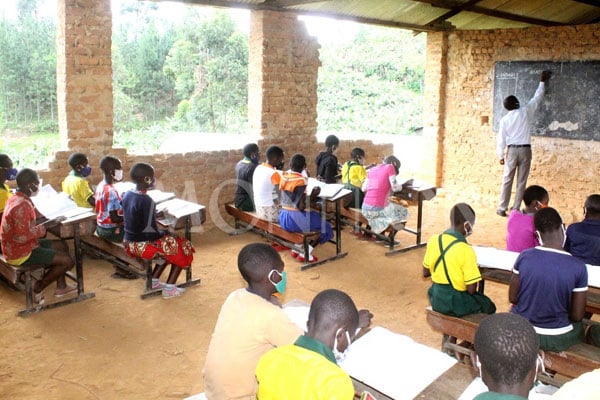
Writer: Wycliffe Nsheka. PHOTO/FILE/COURTESY
In September, the Uganda National Examinations Board (Uneb) released the 2023 report on the implementation of the new Competence-Based Curriculum (CBC) at O-Level. A troubling anecdote during the release was a case of a teacher, unable to find space inside an overcrowded classroom, and delivered a 90-minute lesson from the doorway.
While the anecdote sounds disheartening, it is also a testament to the incredible resilience and dedication of Uganda's teachers. Despite challenges, they remain steadfast in their mission to shape the future of our children and our nation.
As we celebrate World Teachers' Day (October 5) under the theme “Valuing teacher voices: Towards a new social contract for education”, we recognise that our teachers are not just merely foot soldiers to implement policies, but rather they are the who shape our national educational landscape and are champions of change.
The reopening of schools after nearly 22 months of the Covid-19 pandemic-induced closure provided a powerful reminder of this resilience. I recall one teacher then, telling me her job a few weeks after the school reopening was "to bring back learners' hearts and minds to the school environment," even as she struggled with her own well-being. This deep sense of responsibility and care for the learner from our teachers, is not only a mark of leadership in a crisis but also a pillar of resilience in our education system.
Teachers have always been at the forefront of education reforms in Uganda, leading the way and providing useful insights for improvement that policymakers might have missed out. Their voices and efforts have shaped the environment for effective policies. For example, teachers’ unions collaborated with the National Curriculum Development Centre (NCDC) to ensure the successful rollout of the CBC through training master trainers across different regions.
Additionally, teachers have been instrumental in raising awareness about the new lower secondary curriculum, educating parents about its value, and helping students understand the benefits it brings to their future.
At an awareness workshop organised by the Education ministry of Education at Jinja College School last April, teachers rallied around the CBC despite its challenges. Their consensus was clear: let’s make the curriculum work. This leadership in the face of reform is not just admirable—it’s indispensable. Uganda stands to gain immensely if we continue to elevate teachers' voices in discussions about education reforms, and in emerging fields like climate change and digitalisation in education.
Teachers' daily experiences—both their triumphs and struggles—provide unique and valuable insights into the realities of our education system. The United Nations Secretary-General’s High-Level Panel on the Teaching Profession in July 2023 highlighted that the absence of teachers’ voices in decision-making is one of the greatest challenges facing the profession. Social dialogue with teachers is essential to transform education in Uganda but dialogue alone is not enough. Teachers need professional autonomy to adapt their teaching methods to diverse educational contexts. They must have the freedom to be innovative and responsive, as demonstrated during the Covid-19 pandemic when many teachers found creative ways to engage students despite limited resources. The pandemic proved that teacher innovation is what gives education systems their adaptability and resilience. And to achieve this professional autonomy, we must invest more in our teachers.
As we celebrate our teachers, we must commit to strengthening this social dialogue—not just about education reform, but also addressing the broader challenges teachers face, ranging from issues on professional development, working conditions to compensation. We must create inclusive environments where teachers can thrive with the autonomy to meet the unique demands of their classrooms.
Ultimately, the future of Uganda rests in the hands of our teachers. They are the ones who will guide our students toward success and, in doing so, shape the future of our nation. This is not just a national responsibility but a shared vision across Africa. We cannot afford to fall behind in this collective effort. Recognising the importance of education in shaping the continent's future, the African Union has made it the focus of its 2024 theme: "Educate an African fit for the 21st Century: Building resilient education systems for increased access to inclusive, lifelong, quality, and relevant learning in Africa." Our teachers stand as a crucial pillar in achieving this vision.
The writer, Wycliffe Nsheka, is the Country Director, Finn Church Aid Uganda






